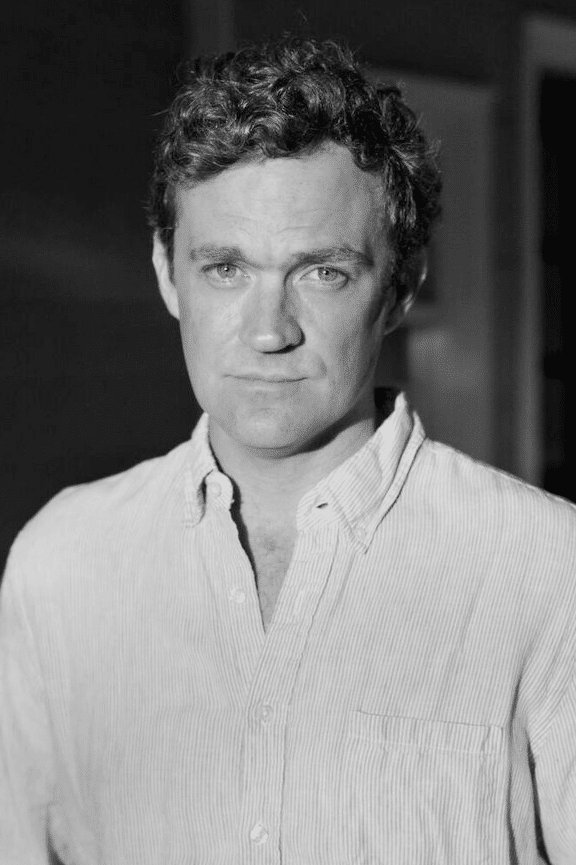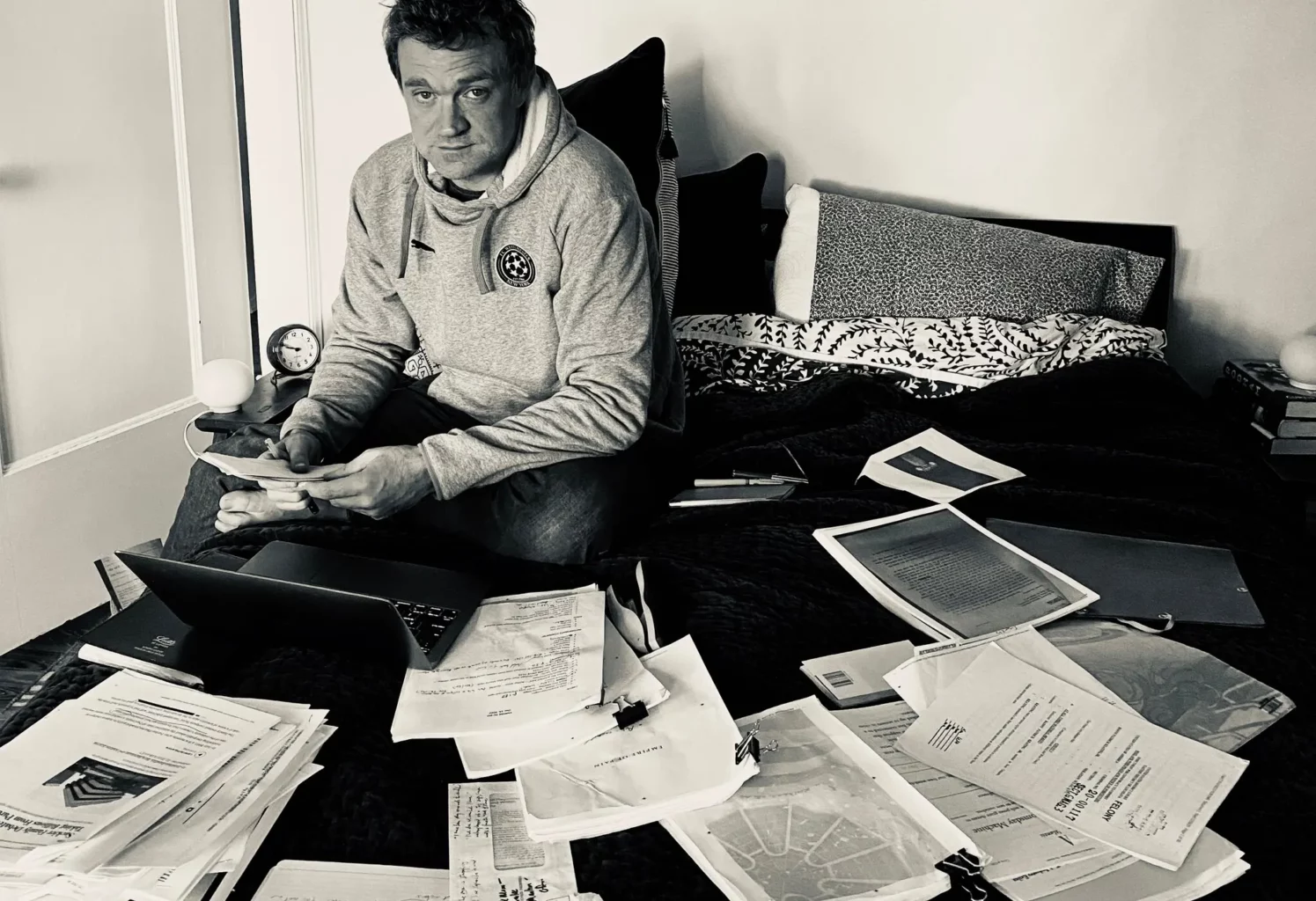Although Portland Arts & Lectures subscriptions are closed, single tickets are now available to see Patrick Radden Keefe on February 22nd! Click here for more information.

On February 22nd, Literary Arts will host Patrick Radden Keefe as the fourth event of our 2022-23 season of Portland Arts & Lectures.
Patrick Radden Keefe is an award-winning staff writer at The New Yorker and the author of four books including the New York Times bestsellers Empire of Pain: The Secret History of the Sackler Dynasty, which was awarded the Baillie Gifford Prize for Nonfiction and was a finalist for the FT Business Book of the Year, and Say Nothing: A True Story of Murder and Memory in Northern Ireland, which received the National Book Critics Circle Award for Nonfiction, the Orwell Prize for Political Writing, and and Rogues: True Stories of Grifters, Killers, Rebels and Crooks (2022), a best book of the year pick for Goodreads and The New Yorker. He is also the creator and host of the eight-part Cold War podcast Wind of Change. Rolling Stone describes Keefe as “an obsessive reporter and researcher, a master of narrative nonfiction.” His work has also appeared in The New York Review of Books, The New York Times Magazine, Slate, and other publications.
From New York’s Chinatown to Northern Ireland, Keefe’s books have investigated international human smuggling operations, global surveillance, and more. How does one distinguish a credible line of inquiry from a conspiracy?
Listen to Keefe’s award-winning podcast, Wind of Change, to hear about the possible link between a West German power metal band, the fall of the Berlin wall, and the CIA.

“With ‘Wind of Change,’ I did it as a podcast and not as an article because I knew from the start that it would end in an ambiguous place. If it was true, it would be very difficult for me to prove that dead to rights, and if it wasn’t true, it would also be difficult for me to prove that negative. I struggled, because I wanted to write about it, but I didn’t know how to do it in a way that wouldn’t feel indulgent. Then I woke up in the middle of the night one day and thought: ‘No, it’s a podcast. That’s what it wants to be.’ There’s something weird about podcasting where I think there’s more generosity, maybe even more indulgence, from the listener.”
—Propublica

Keefe has written investigative reports on political figures, crime syndicates, and drug lords. How does he approach writing about elusive figures? What sort of tactics and research go into writing journalistic profiles?
Keefe discusses writing compelling profiles, the “writearound,” and more, in this Lithub article.
“In magazine journalism there is an editorial tendency, when a subject won’t give you the time of day, to just move on: If they won’t play, then we won’t write about them. But over the years I’ve come to believe that one of most overrated aspirations in journalism is access. This is particularly true in any story involving people who are wealthy or powerful, and who have experience in dealing with the press.”
While he is primarily focused on investigative reporting, Keefe’s storytelling ability is often compared to that of a fiction writer. What novels might you find on the shelf of an award-winning journalist?
He talks about his reading habits, writers he looks up to, and more in this New York Times interview.

“My entire life is a state of perpetual embarrassment about the many books I haven’t read. Have mercy on me. Let’s not even start.”
Take a closer look at Keefe’s biography and career below.
Patrick Radden Keefe was born in 1976 and grew up in Dorchester, Massachusetts. He is the oldest of three children born to his mother, a philosophy professor at the University of Massachusetts, and his father, a real estate developer. He completed his undergraduate degree at Columbia University before going on to earn an M.Phil from Cambridge University and an M.Sc. from the London School of Economics, followed by a J.D. from Yale Law School.
Throughout his time in higher education, Keefe was pitching stories and facing rejections, before taking a year from his studies at Yale law to focus on his writing. In 2005 he got his first pitch accepted to The New Yorker, and his first book, Chatter: Dispatches from the Secret World of Global Eavesdropping, was published by Random House. Written while on a fellowship from the New York Public Library, his debut investigated intelligence agencies along with domestic and global surveillance practices. Chatter was called “an illuminating inquiry into little-visited corners of spookdom” in Kirkus Reviews. His following book, The Snakehead: An Epic Tale of the Chinatown Underworld and the American Dream (2009), delved into a human smuggling operation that brought immigrants from China to the United States in the 1980s through 2000, the surrounding political and historical contexts, and the stories and investigations into the operation.
Keefe began researching his next book, Say Nothing: A True Story of Murder and Memory in Northern Ireland (2018), after coming across an obituary in The New York Times in 2013. The book examines the violent struggle in Northern Ireland known as the Troubles, and the personal and political repercussions of the unrest. In his review for The New York Times, Roddy Doyle called Keefe “a terrific storyteller,” saying, “he brings his characters to real life. The book is cleverly structured. We follow people—victim, perpetrator, back to victim—leave them, forget about them, rejoin them decades later. It can be read as a detective story.” Say Nothing was the winner of the National Books Critics Circle Award and the Orwell Prize for Political Writing, a finalist for the Kirkus Prize, longlisted for the National Book Award, and appeared on numerous best books of the year lists. The story is currently being developed into a limited series for FX.
During his career, Keefe has said he regularly uses the “writearound,” where “a journalist doesn’t have access to the central subject, but writes around that void, talking to people who know the subject, and gathering materials: previous published and unpublished interviews, oral histories, letters, memoirs, emails, court testimony, and so forth.” He has said that this tactic was especially useful when he was writing Empire of Pain: The Secret History of the Sackler Dynasty (2021), about the Sackler family and how their company, Purdue Pharma, played a role in the opioid epidemic. The book was the winner of the Baillie Gifford Prize and a Goodreads Choice Award, was one of Barack Obama’s favorite books of the year, and was called one of the best books of 2021 by numerous outlets.
Keefe’s latest title, Rogues: True Stories of Grifters, Killers, Rebels and Crooks (2022), was a New York Times bestseller and a best book of the year pick for Goodreads and The New Yorker. The collection features twelve of his profiles written for The New Yorker, including those on producer Mark Burnett (The Apprentice, Survivor, The Voice), drug lord El Chapo, and the late chef Anthony Bourdain. An NPR book review for Rogues praised Keefe’s “immense skill as a storyteller” and called the book “compulsively readable, imbued with narrative tension that’s never overwrought or melodramatic.”
In addition to writing his book-length nonfiction, Keefe is a staff writer at the New Yorker and his work has appeared in The New York Times, Slate, and elsewhere. He has received a Guggenheim Fellowship, along with fellowships from the New America Foundation and the Woodrow Wilson International Center for Scholars. In 2014 he was the recipient of the National Magazine Award for Feature Writing for his New Yorker article, “A Loaded Gun.” He also wrote and hosted the 2020 podcast Wind of Change, an investigation into the conspiracy theory that the CIA wrote the Scorpions’ 1991 hit song “Wind of Change.” The show was considered one of the best podcasts of the year by Guardian, New York Times, and elsewhere. Wind of Change won multiple Ambie and Webby awards and is now being developed into a limited series for Hulu.
Keefe lives in New York, where he is a fellow at the New York Institute for the Humanities.
For more about Patrick Radden Keefe, please visit prhspeakers.com.
“When you don’t have that central interview, or the blessing of the subject, you have no choice but to track down others who might not offer such reliably glowing assessments, and to build out a notebook full of sources so that you can cross-check second hand anecdotes and stress test your own hypotheses. When you put in that additional work, it tends to manifest in a deeper, richer story, one not compromised by the editorial hand of the interview subject or her handlers, yet one which, paradoxically, brings the reader closer to her than you might have had you had the opportunity to look her in the eye.”


